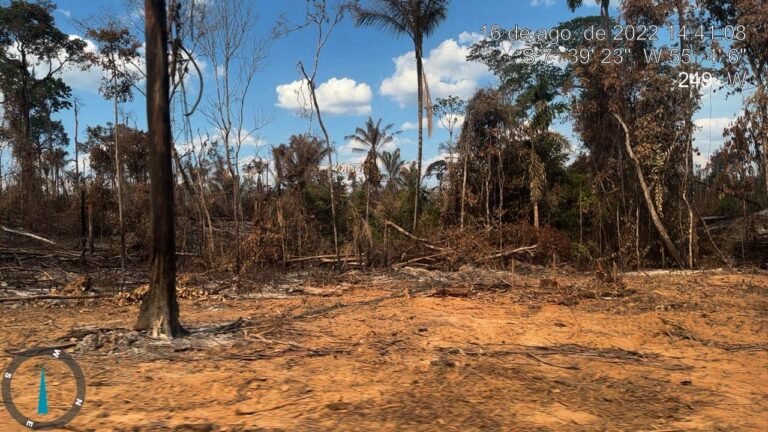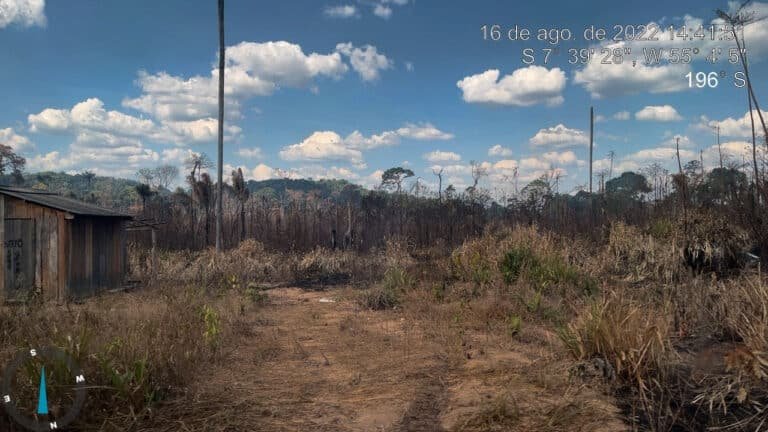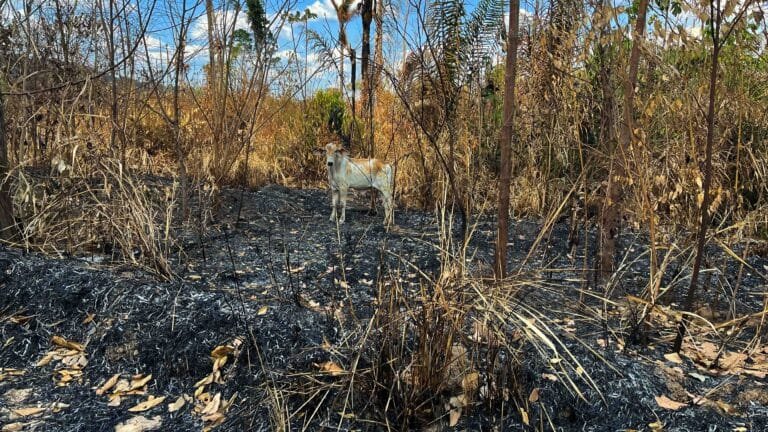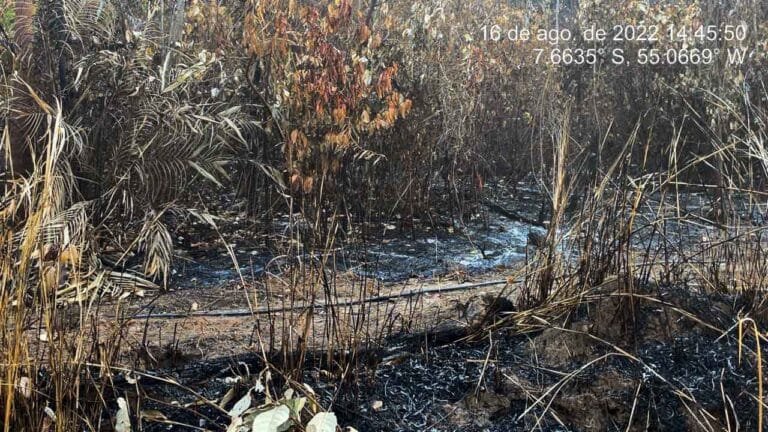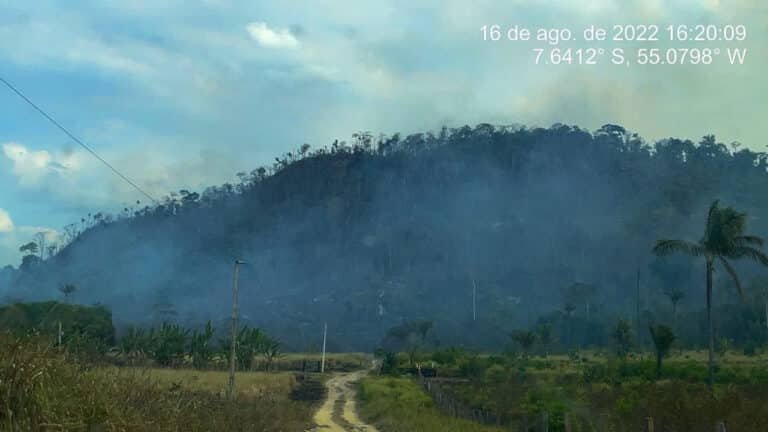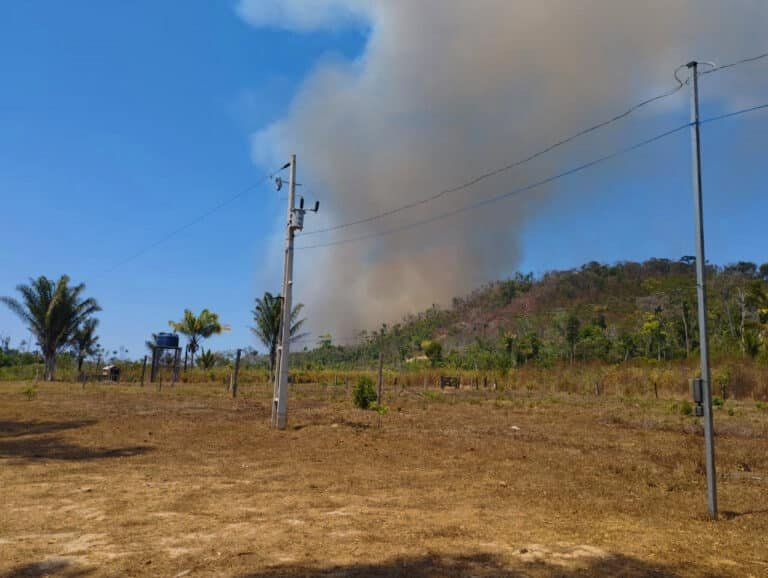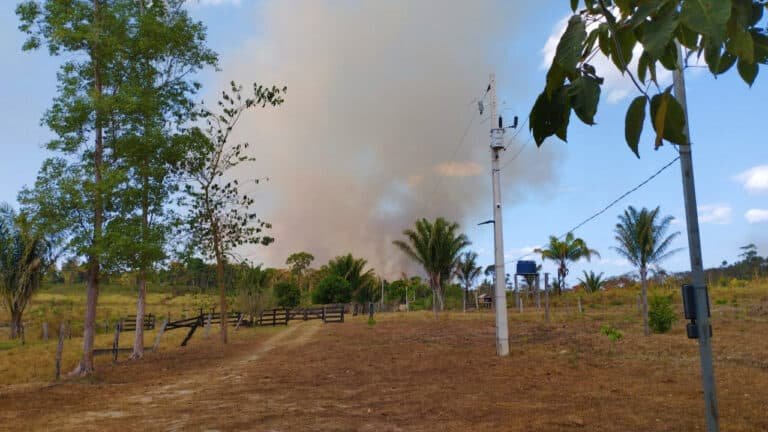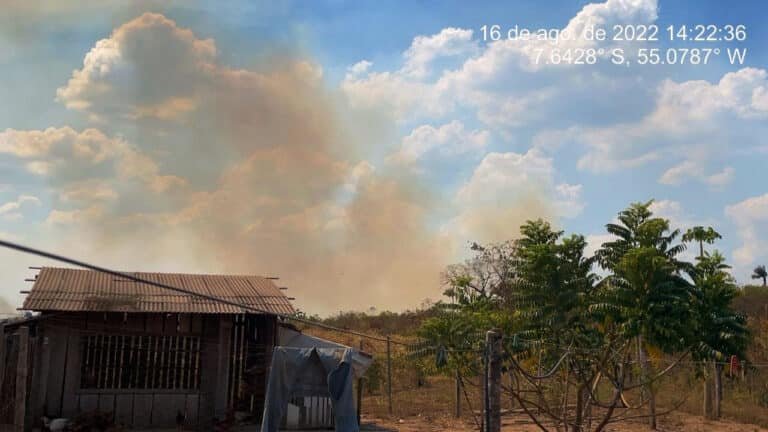Pará
AMAZÔNIA
The recent occupation and colonization of the Amazon region has been extremely violent for the populations who already live in its territories, under the mismanagement and ineptitude of public authorities who are incapable of handling conflicts, many of which were caused by the collusion of the State itself.
In this essay, we systematize the case of the Terra Nossa Sustainable Development Project (PDS), to document one of many confrontational situations in the Brazilian Amazon, highlighting the prevalence of deforestation, arson, agrarian conflicts, and the advance of agribusiness.
The Terra Nossa PDS was legally established by the National Institute for Colonization and Agrarian Reform (INCRA) in June 2006[1], on an area of 149,842 hectares, partly on the Curuá parcel (33.7% of the PDS area) and partly on the Gorotire parcel (66.7%). It is located in the municipalities of Novo Progresso and Altamira, both in southwestern Pará state. Novo Progresso is located on the BR 163 highway, on the border of Pará and Mato Grosso states.
The State of illegality behind the founding of the PDS
It is important to be aware of the context in which the PDS came to be, starting with the creation of municipalities in the southwest region of Pará. A study by Castro[2], Monteiro, and Castro describes the origins of the municipality of Novo Progresso and the Castelo de Sonhos district, in the municipality of Altamira, as part of the colonization policies of governments during the military dictatorship. The occupation of this region intensified after the BR-163 highway was inaugurated in 1976, and the population influx only diminished in the 1990s.
Geographer Ariovaldo Umbelino de Oliveira[3] has described how these cities were born and emerged through illegal activities involving public resources, such as land grabbing, logging, and illegal gold mining. Such pursuits attracted entrepreneurs mainly from the South of Brazil to take over land and exploit the region’s natural resources, as well as impoverished migrants from the Northeast of Brazil in search of land and work.
This was the context for the families who moved into the Terra Nossa PDS since 2000, on plots drawn by lotteries, as shown by Incra in its own land-tenure assessment:
The families initially settled in the Terra Nossa PDS occupied the Vale do Jamanxim PDS, created in 2005 in the area where the Jamanxim National Forest (Flona) was created the following year. With the establishment of the Conservation Unit, the families were forced to leave the Vale do Jamanxim PDS and were taken into two landless workers’ camps supported by the Novo Progresso Rural Workers Union (Sindicato de Trabalhadores e Trabalhadoras Rurais de Novo Progresso – STTRNP). Based on a drawing among the camped families, INCRA selected the beneficiaries to occupy 240 (two hundred and forty) plots initially demarcated, although the project’s capacity is for 1000 families and there were 1000 projected plots[4].
At that time, land grabbers had already taken over much of the land that Incra had plotted out for the settlement, and many of its areas were already considered to be farms. Incra performed the legal registration and occupation of the plots by the families, but did not remove the “farmers” and irregular occupants in the PDS, although its own land-tenure diagnosis had identified their presence, which led to several situations of conflict and human rights violations that persist to this day.
In 2018 alone, three rural workers were murdered. There are strong indications of a fourth murder in the same year, after a union member who received several threats – due to a conflict involving land grabbing – disappeared and his body was never found. Today, other settlers also face death threats, like Maria Marcia Elpidia de Melo, now included in the Protection Program for Human Rights Defenders in the state of Pará. The leader suffered an attempted murder in 2020, when a car chased her and rammed the vehicle she was in, with its occupants shouting that she “must die”[5]. Her son, who also lived in one of the lots, was beaten and threatened with death. According to the community leader:
People who stand out either die or disappear. And they [the invaders] make up any old story to justify it. And the police come and say that they were drunk, got in a fight, died, and that’s it.”[6]
The Terra Nossa PDS is clear proof of the role of the State as the main violator of human rights. The “neglect” of settlers legally enrolled in the Terra Nossa PDS roster of beneficiaries clearly cannot be blamed on any absence or lack of structure to address their problems. Every day, the State shows that it acts the way it does intentionally, favoring irregular occupants to the detriment of the legal settlers. The coexistence between legitimate settlers who meet the legal criteria as land reform beneficiaries and “landowners” and loggers with opposing interests and profiles cannot be peaceful, and the situation, in itself, already amounts to a conflict of interests.
The upshot of this is the landscape of violence and environmental degradation in a territory that – in theory – should be a Sustainable Development Project, a different approach to settlements designed by INCRA itself, for a region with vast forests surrounding a mosaic of environmental conservation units. In a PDS, traditional extractivism, sustainable management and the settlers’ livelihoods should coexist harmoniously with nature and preserve the collective reserve forest area. This reserve, however, is completely occupied by cattle ranches and, after the so-called “Day of Fire”, by large soy plantations consolidated and expanding around the PDS.
Notes
CASTRO, E. R.; MONTEIRO, R.; CASTRO, C. P. Dinâmica de atores, uso da terra e desmatamento na rodovia Cuiabá–Santarém. Belém: NAEA, 2004.
OLIVEIRA, Ariovaldo Umbelino de. BR-163 CUIABÁ-SANTARÉM: Geopolítica, grilagem, violência e mundialização. In: TORRES, Mauricio. Amazônia revelada: os descaminhos ao longo da BR 163. Brasília. CNPQ, 2005, p. 67 – 183.
INCRA. Diagnóstico Fundiário do Projeto de Desenvolvimento Sustentável do PDS Terra Nossa. Ordem de Serviço nº 54/2016/INCRA/SR30G. Santarém, 2016. p. 23
Article: “’Eu sei que vou morrer. Só não quero que matem meu filho’, diz liderança no Pará”, by Ciro Barros (Agência Pública, 03/09/2019),
Beyond the “Day of Fire”: The PDS burns every year
Here we have highlighted some of the main factors behind the scenario of violence and degradation, but we know that a single text cannot address all the evils in the Terra Nossa PDS. Arson, deforestation, mining, and illegal logging are the main activities generating violence against the rural workers and settlers in Terra Nossa.
One criminal event with major national and international repercussions, known as the “Day of Fire”, happened on August 10 and 11, 2019. In a campaign organized and orchestrated by “ruralist” politicians and cattle ranchers in northern Brazil, mainly western Pará, huge public areas were set ablaze, in the middle of the Amazon rainforest, to secure their criminal occupation.
The Terra Nossa PDS was one of the land grabbers’ targets, and the arson destroyed plantations and intimidated the settlement’s leaders and families. Soon after, several organizations denounced that the burned area had been converted into soy plantations, while local politicians threatened families who made the accusations[7].
Notes
See: “BR-163 em chamas, conflitos e contradições” (Comissão Pastoral da Terra, 28/08/2019). Available here. “Mesmo após ‘Dia do Fogo’, madeireiros seguem destruindo Amazônia e ameaçando assentados, by Daniel Camargos (Repórter Brasil, 29/10/19). Available here, and “Queimadas quadruplicam em assentamento mais incendiado do Pará”, de Ciro Barros e Iuri Barcelos (Agência Pública, 27/08/2019). Available here.
While the arson caught the headlines in 2019, the PDS catches fire every year, clearing the way for soybeans and intimidating peasant families. In 2022, exactly three years after the “Day of Fire,” the same action was repeated by the same criminals against the Terra Nossa PDS, with the same cycle of violence against the residents. A solidarity letter[8] mobilized by the Land Pastoral Commission and the Agro é Fogo network united more than 50 organizations to demand that local authorities take steps to protect the families and fight the fires. The case gained national repercussion and was reported in the country’s main TV news[9].
Pressure from agribusiness to expand soybeans
The forest and its peoples are under pressure from agribusiness in southwestern Pará, where the BR 163 highway is used to ship soybeans, intensively farmed nearby in Mato Grosso, where the crop is expanding northward. Historically, the territory along the BR 163 is strategic for agribusiness and its local allies to meet the demand for exports down the Tapajós River.
There is a whole logistics infrastructure, including a port complex, under construction in the region, which will have countless impacts on the communities. It is clear that this stretch of the BR 163 highway in the state of Pará, which connects Novo Progresso to Itaituba, on the banks of the Tapajós River, is a strategic route for agribusiness. This is why the pressure on forest areas and territories of traditional peoples and communities, as well as other areas of public land already designated for agrarian reform settlements, has increased exponentially. Could this be one of the reasons why the State, mainly through INCRA, does nothing to solve conflicts in the Terra Nossa PDS?
Soybeans are invading areas[10] in the Terra Nossa PDS burned by what is now the yearly “Day of Fire”. The area cultivated inside and outside the settlement expands after the fires, showing how arson is used effectively for deforestation, land grabbing, and the territorial expansion of agribusiness, with no interference by the State. This means ever-greater destruction of the territory and the forest, and the aggravation of human rights violations against agrarian reform settlers. Fire has irreversible effects in many areas within the PDS, especially in the preservation areas, which become meaningless, and are soon cut down to become pastureland and later planted with soybeans or grass.
Therefore, the irregular occupation in the Terra Nossa PDS, which is no exception, is due to the State’s deliberate “absence” from the agrarian reform settlements. We confirm this, on the one hand, by the slow implementation of agricultural credit and development projects in the settlements, which should guarantee the settlers’ stability and livelihoods in their parcels. On the other hand, INCRA has also made no enforcement efforts to prevent the irregular sale of lots or to remove irregular occupants identified by its agents, thus increasing conflicts in the countryside.
In response, settlers still resist and keep demanding their rights, through their “Nova Vitória,” the only association that is resisting. They spare no efforts and risk their lives to demand that public authorities comply with public policies, while also denouncing environmental crimes and crimes against people.
José Raimundo de Santana is an agent of the Land Pastoral Commission in Itaituba/Pará, and a lawyer with a graduate degree in Mining Law.
Raione Lima Campos is the regional co-ordinator of the Land Pastoral Commission in Pará, and a lawyer specialized in Agrarian Law at the Federal University of Goiás (UFG).


